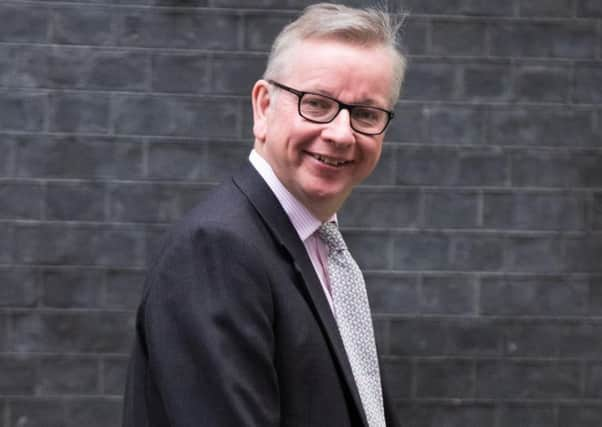Gove says soil health will dictate future of farm support funds


Addressing landowners at the Country Land and Business Association’s (CLA) annual Rural Business Conference, the Secretary of State offered more insight into what was to come for the industry as the Government draws up its policies for a future outside of the European Union’s Common Agricultural Policy (CAP).
All the rhetoric from the Minster since his appointment at the start of the summer has been about a “Green Brexit”, and that message was delivered with gusto in London earlier today.
Advertisement
Hide AdAdvertisement
Hide AdGiving an example of the need to tailor a policy that puts the environment at its heart, Mr Gove highlighted how 84 percent of fertile, peat topsoil had been lost in East Anglia over the last 200 years.
“The rate at which vast stores of carbon held in the soil has been lost is nothing short of an emergency,” he said.
“We know that 95 percent of food production relies on soil... a quarter of the world’s biodiversity comes from soil so it’s clear that we need to think and act together more sustainably.
“Soil is a fundamental asset and its degradation costs us money so we must, in future agricultural support funding, prioritise the health of our soils.”
Advertisement
Hide AdAdvertisement
Hide AdMr Gove laid the blame for much environmental damage on the CAP, saying that it had inspired methods of agricultural production in the UK that have led to soil degradation worth £1.2bn a year.
Since joining the EU the number of farmland birds had declined by 54 percent, the population of priority species had declined by 33 percent and some specific bee populations had seen 49 percent declines, the Minister claimed.
Describing the current system of farm support, whereby landowners receive both direct payments based purely on the size of their estates - pillar one payments - and less so through separate schemes for delivering prescribed environmental enhancements, he said it was “inefficient, ineffective, inequitable, and environmentally harmful”.
Mr Gove claimed that while genuine environmental improvement under pillar one had been slight, public money properly allocated through agri-environment or environmentally-led schemes can secure significant gains.
Advertisement
Hide AdAdvertisement
Hide AdHe quoted figures from the Farmland Bird Index that demonstarte that farmers operating countryside stewardship schemes had seen huge increases in farmland bird numbers compared to an overall national decline.
But the problem is, Mr Gove said, that only one-fifth of the money allocated through Defra goes to environmental land management schemes, while direct, pillar one payments accoutnt for around 80 per cent of payments.
“I believe that has to change,” he said.
Asked who would lose out from reduced direct payments, the Minister said: “If you are the sort of person who has bbeen concentrating on avoiding changing, avoiding adapting, avoiding thinking about increased productivity or environmental enhancement then you will be caught out.”